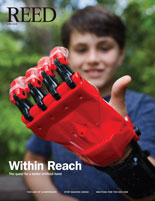
IRIS login | Reed College home Volume 95, No. 2: June 2016
The Longest Hour

By Chris Lydgate ’90
The hour has come. The candidate enters the room and takes her seat at the head of the table. The door clicks shut. The professors square up their chairs. Through the window, there’s a glimpse of spring in the lush green grass. Inside, the mood is friendly, but not relaxed. Because today is the day the candidate must defend her thesis.
For eight long months, she has devoted herself to this intellectual adventure. She spent countless hours with her adviser homing in on a topic. She scoured the existing literature to see what other researchers discovered. Formulated a hypothesis. Cooked up an experiment. Fine-tuned the design.
Five days a week, she rose at dawn to put her rats through their paces. She tinkered with their reinforcement schedules, observed their behavior, even scrubbed their cages. She analyzed the results, pondered the implications, plunged into the sea of variables like a pearl-diver, and swam back to the surface carrying a precious treasure—a conclusion.
Now she has to justify her choices to a board of examiners. Has she mastered the scientific literature? Does her experiment provide a real test of her hypothesis? Is the design sound? Do the results make sense, or has some unknown factor rendered them meaningless? Has she reached a valid conclusion? And perhaps most important, can she show why the question matters?
Over the last several years, I’ve had the privilege of observing several Reed students defend their theses (having infiltrated the proceedings under the guise of an “outside reader”). The topics have ranged from African famines to medieval French farces to the yellow fever epidemic of 1793. It’s not unusual for students to look a little stressed in the first few minutes (I snapped a pencil at my own oral exam back in 1990). After all, it can be kind of nervewracking to demonstrate your grasp of an entire field to the very professors who introduced you to the discipline.
Today’s exam opens simply enough, with questions about experimental design and the relevance of animal models in understanding human behavior. But soon we are in deeper waters—agency, racism, solitary confinement. Does psychological theory operate from the top down, or from the bottom up?
And then something magical happens. We are no longer interrogators grilling a student. We are all fellow explorers, comrades of the quest, confronting fundamental issues, and learning from each other.
Time runs short and we ask the candidate to wait outside, but there is no doubt; our decision is unanimous. We invite her back and offer our congratulations. The exam is over, but the journey is just beginning.

LATEST COMMENTS
steve-jobs-1976 I knew Steve Jobs when he was on the second floor of Quincy. (Fall...
Utnapishtim - 2 weeks ago
Prof. Mason Drukman [political science 1964–70] This is gold, pure gold. God bless, Prof. Drukman.
puredog - 1 month ago
virginia-davis-1965 Such a good friend & compatriot in the day of Satyricon...
czarchasm - 4 months ago
John Peara Baba 1990 John died of a broken heart from losing his mom and then his...
kodachrome - 7 months ago
Carol Sawyer 1962 Who wrote this obit? I'm writing something about Carol Sawyer...
MsLaurie Pepper - 8 months ago
William W. Wissman MAT 1969 ...and THREE sisters. Sabra, the oldest, Mary, the middle, and...
riclf - 10 months ago